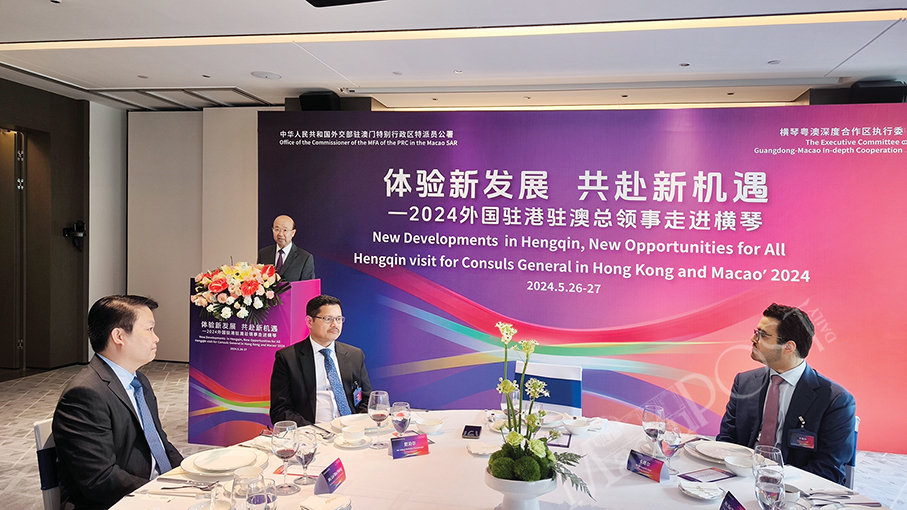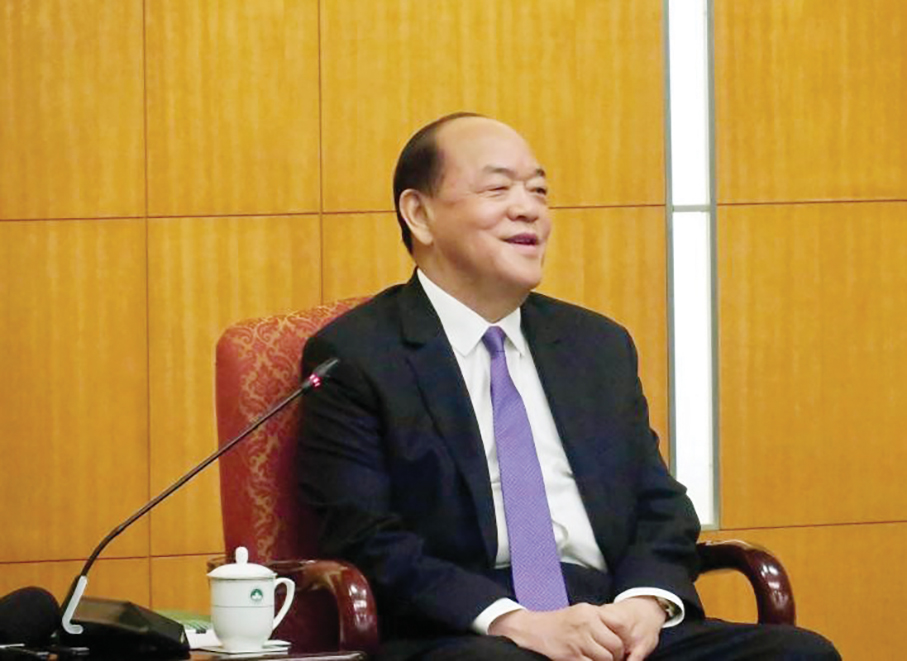Institutional strengths, new quality productive forces, Chinese modernisation
A two-day fact-finding trip to Hengqin organised by the Foreign Ministry Commissioner’s Office in Macau for consuls-general or consuls from 23 foreign countries to Hong Kong and Macau concluded with a working luncheon yesterday, during which commissioner Liu Xianfa delivered a speech highlighting three “codes” thanks to which Hengqin has achieved a good economic growth performance: institutional strengths; the development of new quality productive forces; and Chinese modernisation.
The commissioner also said that Hengqin, a 106-square-kilometre island, has become a new source of growth in the Guangdong-Hong Kong-Macau Greater Bay Area (GBA), adding that Hengqin is full of vigour and vitality and developing “with each passing day”. He also said that Hengqin’s development has now started “accelerating”.
The Office of the Commissioner of the Ministry of Foreign Affairs (MFA) in the Macau Special Administrative Region (MSAR), which Liu has headed since 2021, organised the two-day tour, which began on Sunday and ended yesterday, of Zhuhai’s Hengqin island for the 23 consuls-general or consuls with the aim of enabling them to gain a better understanding of the island’s latest development achievements and prospects.
The Foreign Ministry Commissioner Office invited Macau journalists to join and cover the two-day fact-finding visit.
On the first day of the tour on Sunday, members of the delegation attended the opening ceremony of the 2024 Hengqin Global Investment Promotion Conference at Chimelong Hengqin Bay Hotel, which was organised by the executive committee of the Guangdong-Macau In-depth Cooperation Zone in Hengqin. The conference lasted two days.
On the second and last day of the trip yesterday, the delegation visited the Hengqin Exhibition Hall, the second-tier inspection area of the “tier-specific management” special customs arrangements, and a cross-border e-commerce and live streaming base, before a working luncheon.
In his speech at the luncheon, Liu noted that this year marks the 25th anniversary of Macau’s return to the motherland and the 3rd anniversary of the establishment of the in-depth cooperation zone, adding that this year is also slated to achieve the zone’s first-phase development goals.
The zone was inaugurated in September 2021. Its top decision-making body is the administrative committee, which is jointly headed by Guangdong Governor Wang Weizhong and Macau Chief Executive Ho Iat Seng.
The zone’s executive committee, which is run under the administrative committee, is the body tasked with the zone’s daily functioning and execution of tasks. The executive committee is headed by Macau Secretary for Economy and Finance Lei Wai Nong.
Liu noted yesterday that the zone recorded an average annual economic growth of about four percent in the past three years, despite the adverse impact of the COVID-19 pandemic, with its industrial development flourishing, external trade rising, and Hengqin-Macau integration producing more solid results.
In the first quarter of this year, according to Liu, the zone’s gross domestic product (GDP) grew 9.2 percent year-on-year in real terms, while the total volume of trade increased 22.6 percent year-on-year in the three-month period.
Liu noted that the in-depth cooperation zone’s “tier-specific management” special customs arrangements took effect on March 1 this year, which, he underlined, is a breakthrough to facilitate high-standard institutional opening up, marking a significant step towards a new system of Macau-Hengqin integration.
“Thanks to the new policy, scientific and technological innovation enterprises can now carry out research in Macau and deploy research results in Hengqin. Macau residents can live in Macau and work in Hengqin. A new industrial model has primarily taken shape, under which international resources are brought in to generate shared benefits, with Macau serving as a platform and Hengqin providing development space,” Liu said.
In his speech, Liu shared his three observations about Hengqin’s “growth code”.
The first growth code is the fundamental guarantee provided by institutional strengths, Liu said, adding that the “One Country, Two Systems” policy is Macau’s greatest strength, adding that the very aim of developing the in-depth cooperation zone is to fully leverage Macau’s greatest strength to expand the special administrative region’s development space so that it can better integrate into the nation’s overall development and achieve appropriate economic diversification.
Since the inception of the in-depth cooperation zone in 2021, Liu said, efforts have been made to improve the new mechanism of consultation, cooperation and joint administration for shared benefits, and to explore a new system to synergise laws and mechanisms. In doing so, he said, Macau’s strengths as a separate customs territory and a free port that enjoys low taxes and a simple taxation system have been fully harnessed.
This, in combination with Hengqin’s development space and rich resources, has unleashed the potential of preferential policies introduced by the central government, Liu said.
The commissioner said that a high-standard opening-up zone that displays Chinese characteristics and the strengths of the “One Country, Two Systems” policy is being built, while the novel “Hengqin model” that contributes to the more successful implementation of the “One Country, Two Systems” principle is being created.
The second growth code is the solid support of new quality productive forces, Liu said, pointing out that the development of the in-depth cooperation zone is the “epitome” of China’s high-quality development. He also pointed out that the key to China’s robust growth rate amid sluggish global recovery and intertwined geopolitical conflicts lies in the accelerated formation of new quality productive forces.
“With innovation as a salient feature and high quality as a main goal, new quality productive forces amount to advanced productivity in essence,” Liu said.
Liu noted that China’s R&D investment reached US$469 billion last year, bringing forth strategic emerging industries such as a new generation of information technology (IT), biotechnology, new energy vehicles (NEVs) and green industry. Together, they are expected to account for more than 17 percent of China’s GDP in 2025, he said.
The third growth code is the clear guidance of Chinese modernisation, Liu said, adding that China has completed in a span of decades an industrialisation journey that had taken developed countries centuries, accomplishing theoretical and practical innovation on modernisation. Liu said that Chinese modernisation is the modernisation of a huge population, of common prosperity for all, of material and cultural-ethical advancement, of harmony between humanity and nature, and of peaceful development.
Liu said that amid profound changes and turbulence in the world, what Chinese modernisation advocates, namely high-quality development, common prosperity, harmonious coexistence, inclusiveness, and shared benefits, represents China’s distinctive world view, values and development philosophy.
Liu said that this has opened a new pathway for promoting world modernisation and provided effective guidance for the coordinated, innovative, green, open, and win-win development of Hengqin.
Yesterday’s lunch was also attended by Lei. The Foreign Ministry Commissioner’s Office in Macau also organised a fact-finding trip to Hengqin for consuls-general or consuls from various foreign countries to Hong Kong and Macau last year. This year’s tour was themed “New Developments in Hengqin, New Opportunities for All”.
Liu accompanied the delegation during yesterday’s visits to the three facilities in Hengqin.
At each of the three facilities, the delegation members were briefed by the respective staff members, where Liu also gave them additional information and explanations.

Foreign Ministry Commissioner Liu Xianfa delivers a speech during yesterday’s luncheon at Sumjoy Hengqin Tianmu Hotel as Secretary for Economy and Finance Lei Wai Nong (left), Qatar consul-general Ali Saad Al-Hajri (right) and Nepal consul-general Udaya Bahadur Ranamagar look on. The delegation of consuls stayed in the hotel during the two-day visit to Hengqin. – Photo: Tony Wong





